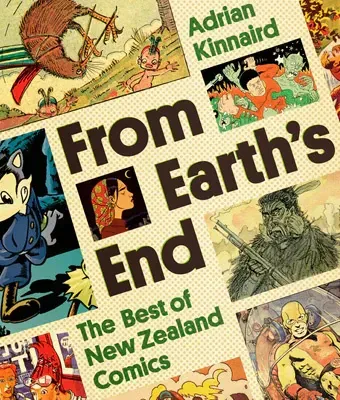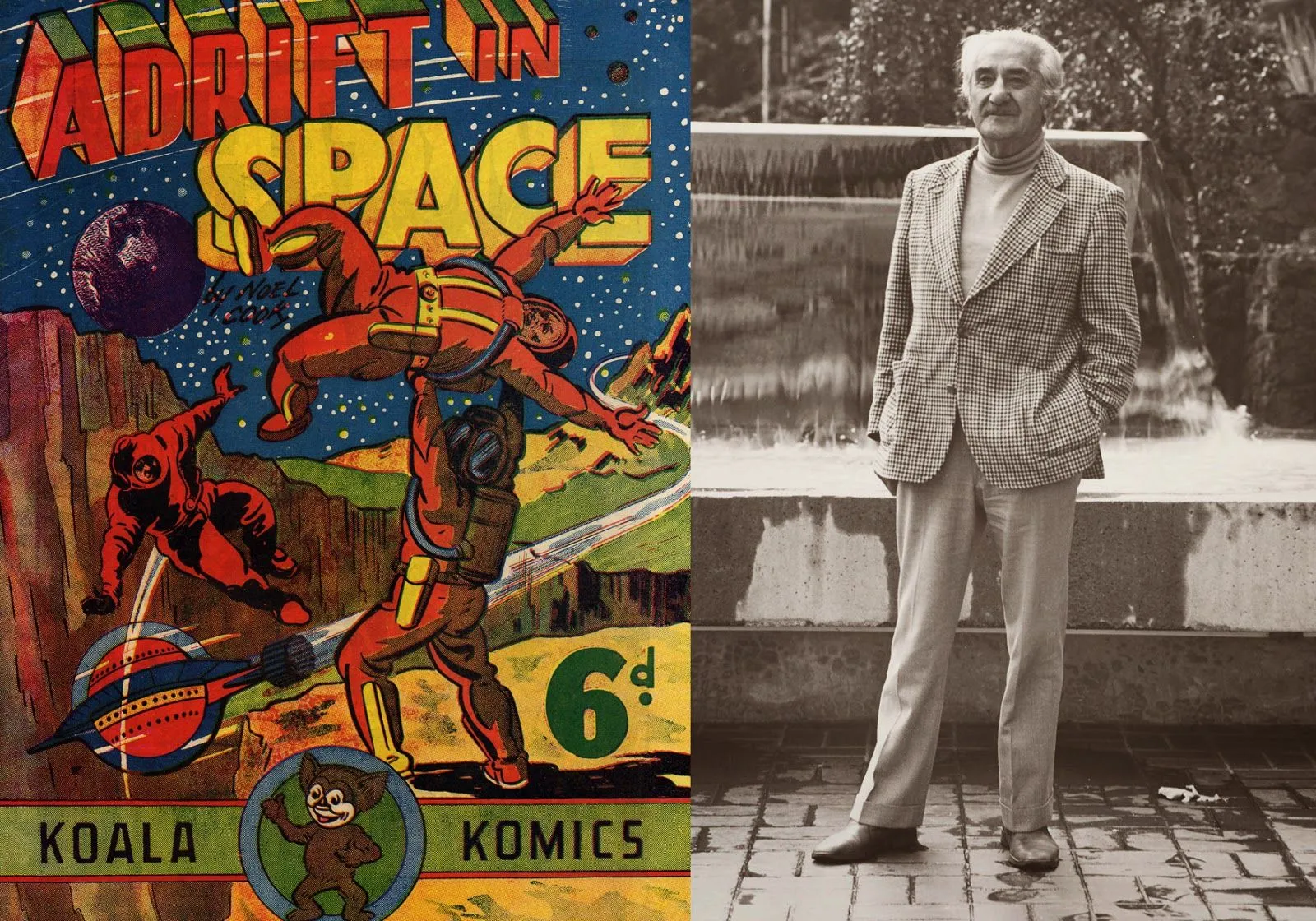Comics from earth’s end

For the past 15 years, Adrian Kinnard has charted the course of NZ comics through his blog and now book, From Earth’s End: The Best of New Zealand Comics. Renee Liang interviewed him about the fall and rise of comics ahead of his appearance this weekend at the Auckland Writers Festival.
* * *
Comics, or graphic novels if you want to feel literary, are everywhere these days. Crossing boundaries between visual art, graffiti, film and fiction, it’s both a versatile and adventurous form, with writers like Dylan Horrocks and Ant Sang gaining an international following. Adrian Kinnaird’s book From Earth’s End: The Best of New Zealand Comics is the first book to look at the history of NZ comics.
You've been a champion of NZ comics for over 15 years, investing tremendous energy into blogging, reviewing and promoting your fellow writers. What drives you to do this?
I'm driven by the belief that there is a wide audience in New Zealand for well produced local comics, we just need to let them know they exist! Starting my blog in 2009 was really the first stage in a multi-year plan to reorganise - and in a way re-brand - the NZ comics scene into something more approachable and user-friendly. At the time the community had become quite insular; we talked about our work and shared comics on a private message board, there was a NZ comics database which was sporadically updated and a nightmare to navigate, basically you really had to go out of your way to find local comics and their creators.
The blog was an effort on my part to add to the infrastructure that fellow cartoonists Isaac Freeman, Claire Harris and Robyn E. Kenealy had started building around events and distribution. I aimed at promoting our comics to the general public and getting them re-engaged. There was so much great material around at the time, that it was very easy for me to hold up a great example of NZ comics and treat it like a publishing event. As the blog continued year to year, I was able to build up a considerable resource of online NZ comics articles and material, which I think really helped our visibility, so you could actually track what was going on in the local comics scene. It also helped me to connect with the wider NZ community and fellow creators on a more personal level - and through those relationships, made it possible for me to tell the story of New Zealand comics.
Your book From Earth's End: The Best of New Zealand Comics is a survey of NZ comics through the ages. Why has no one has done this before?
Probably because it is a hugely daunting proposition! Tim Bollinger - one of the featured cartoonists in the book - has been working on an exhaustive history of New Zealand comics for almost 20 years. I can't speak as to why that book hasn't made it into print yet, but I imagine the share scale of it might be a factor. With my book I tried to streamline the history down into something manageable within the limited space I had, that would give readers a basic overview of the history of comics in New Zealand, and provide an engaging narrative. As with any book like this, there wasn't room to include everything, which lead to many agonising editing decisions (not made easier by deadlines - the book was written in one year, from start to finish). It helped that the reviews have really been overwhelmingly positive, so in that respect I feel fairly vindicated that I made the right choices.
The title suggests there is something in our geography that sets our comics apart. How so?
'From earth's end' was inspired by a quote from Dylan Horrocks talking about his graphic novel Hicksville. To paraphrase, Dylan talked about how comics as a medium exists at the absolute margins of the literary world, and geographically New Zealand is really at the ends of the earth, and it just made sense to him for something as marginal as comics to be celebrated in a isolated place like New Zealand. That really rang true to me, growing up in the Bay of Plenty reading these wonderful objects from another place.
And I do think comics created in New Zealand are quite distinctive. Because we don't have an established publishing industry, creators tend to create stories that are personal to them. They don't follow trends or genre expectations, resulting in a wider variety of comics material than you would find in most countries - which is really extraordinary.
Tell me about the forgotten glory days of the 1950s - why did local comics become popular and then fade into a niche again?
Comics were really coming into their own in the post war era, and were huge worldwide. Here in New Zealand we had two major publishing houses that produced comics (both locally created and reprints of foreign material), and a growing number of cartoonists turning out work. Harry W. Bennett and George F.H. Taylor were two extremely productive cartoonists during this period. In the late 1950's there was a wave of censorship targeting comic books for supposed links to juvenile delinquency. While this was never proven, the accusations happened to coincide with a teen sex scandal in Lower Hutt, leading to sweeping reforms of the censorship laws and practices. With pressure mounting from the government and public, publishers were ultimately forced to discontinue printing comics, and without a publisher or wide distribution, they faded away.
When printing became more affordable and accessible again in the 1970's and 80s, comics returned as an 'underground' movement - created and printed by the author, usually in black & white and in limited print runs. While the production values improved over time, limited distribution has always made NZ comics difficult to find, and from the general public's point of view - pretty much non-existent.
Is it just me or are comics/graphic novels becoming trendy again? Why this sudden rise in literary street cred?
In the last 15 years we've really seen graphic novels make good on their promise as a story-telling medium to deliver complex, sophisticated reads. When it came out in the 80's, Art Spiegelman's graphic novel Maus caused something of a publishing 'gold rush' to discover the next great 'graphic novel', but there just wasn't enough good material ready to go. It would take another decade for projects of equal ambition, like Chris Ware's Jimmy Corrigan or Marjane Satrapi's Persepolis to prove that comics can also be respectable literature. Not that they have to be though - I still enjoy reading superhero comics, but if it helps make it more socially acceptable for me to be seen reading one on the bus, then I'm all for our 'literary street cred!'.
You were behind the hugely successful recent Kickstarter campaign to republish NZ classic The Dharma Punks. Why was the public response so quick?
Thanks! This has actually been a real surprise. We were pretty confident going in that we could make out goal, but we certainly didn't expect to make half of it in a single day! The Dharma Punks is a classic NZ comic book from Ant Sang - one of our most well known creators - so we knew there was an audience for this collection, we just didn't know the response would be that fast! I think it's an enormously encouraging sign that there is an audience out there for more New Zealanders graphic novels.
There's been a new wave of popular interest too, fueled by blockbuster movie franchises - is this good or bad for the art form?
I think in general, any exposure is good exposure. We aren't seeing a huge increase in comic sales from the blockbuster movies - thanks to 50 years of merchandising, corporate comic characters like Superman have become the star, not the medium (more fans buy the t-shirt than the comic book). But films and TV shows based on creator-owned comics have seen huge increases in sales, like Scott Pilgrim and The Walking Dead, which is very encouraging.
What new directions do you predict for NZ comics?
I think we will see a slow, but steady increase in the production of NZ comics and graphic novels as we build on the progress made in the last five years, and as they become more accepted into the local publishing industry. I also think comics have a great advantage in the new evolving book selling model, as they are very viable in both print - as beautifully printed art objects - and in digital form, so it will be interesting to see how it develops.
- The Auckland Writers Festival is on from 14-17 May.

